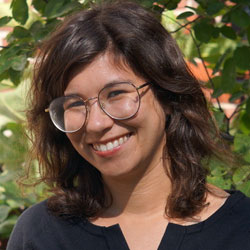Of surgeons putting their knives to erroneous
body parts, stories abound. So can you really blame
my neighbor for how, heading into the operation,
he wrote across his good knee NOT THIS KNEE?
The death of me: I’m never half so bold. You will
feel, the doctor said, my hand and cold –
and I thought of the pub quiz question: which three
countries are entirely inside of other countries?
I bought the bound ONE THOUSAND NAMES
FOR BABY, made two lists: one if she’s born breathing,
one if not. The second list was longer. So much
that I might call her, if she were never to bear
the name, never turn to it, suffer shaming, mull its
range and implications, blame it, change it, move
away to San Marino, Vatican City, Lesotho.
Notes on the Poem
Natalie Shapero's "My Hand and Cold", from her 2018 Griffin Poetry Prize shortlisted collection Hard Child, keeps the reader feeling off kilter, even apprehensive, over the course of seven brief stanzas. Let's examine again how she does it ... and why. Shapero achieves much of the suspenseful sense of the poem by upending and fracturing expected sentence structures. She starts in right away. the unnerving opening sentence amps up the alarm by throwing up frightening imagery - surgeons, knives, erroneous body parts, no less - right off the bat. Starting the sentence more conventionally, with the phrase "stories abound", would have softened or delayed that shocking effect. Clearly, that was not the intent. We're so intrigued with parsing what the doctor says - which explains, but not entirely, the poem's title - that we're again out of sorts, a bit distracted. We're not necessarily paying attention to or wondering why the poem's narrator is having this interaction with the doctor. It starts to dawn on us when she asks the cryptic question (why is she thinking about a pub quiz at a time like this?) "which three countries are entirely inside of other countries?" ... and then is driven home, with a new intensity of shock, when the narrator posits her two lists and ponders one longer than the other. Has she been trying to distract us ... or herself? Examining this a second time, is your reaction different than the first time we looked at this poem?
